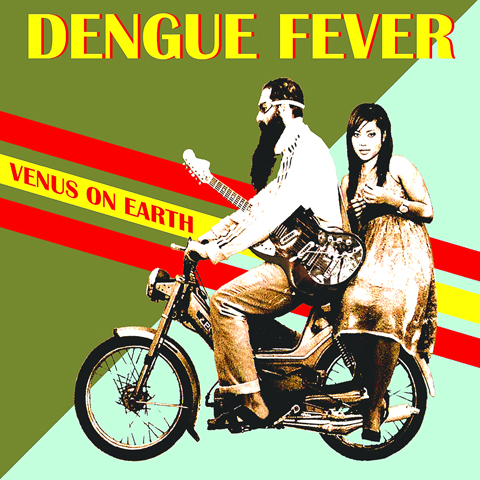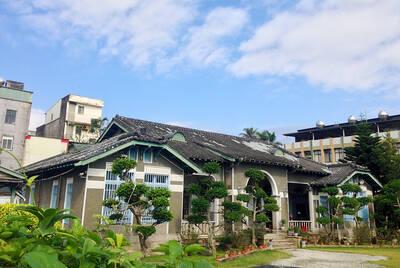Urban Nomad Film Fest (城市游牧影展), Taiwan’s only truly independent underground film festival, kicks into full gear tonight with screenings of Pervert’s Guide to Cinema, Part 1, a dozen shorts, and a film by a director who rode the rails across the US for 16 years, armed with a Super-8 camera and documenting the universe of hobo graffiti.
Now in its seventh year, the festival screens experimental and animation works, features, short films and documentaries by foreign and local filmmakers.
As always, it’s a refreshing change of pace from the earnestness of Taipei’s other film festivals. But in recent years the quality of its program has improved dramatically. What was once primarily a showcase of mostly local, extravagantly lo-fi productions, is now attracting international attention.

PHOTOS COURTESY OF KEVIN ESTRADA
Over the past, Urban Nomad has toured outside Taiwan for the first time. Last year’s program was shown in its entirety this past March in Hong Kong. Organizers were also invited by the Scope art fair to show Urban Nomad films and video art at exhibitions in Miami and Basel, Switzerland.
“The cool thing is that it gave us the chance to show Taiwanese film and art outside Taiwan, which is not happening that much,” said festival cofounder David Frazier. (Frazier was formerly a reporter at the Taipei Times.)
Urban Nomad is now nearly 100 percent bilingual: Chinese-language films have English subtitles and vice-versa. Frazier believes this is one of the main reasons why it’s been attracting more and better films. This year there were more than 250 submissions— 70 were accepted — compared with 140 submissions last year. As late as two years ago, Urban Nomad’s entire program consisted of fewer than 50 films.

Photos courtesy of kevin estrada
A glance at the schedule shows plenty of promise. There’s a special China Human Rights program on Monday. The Corporation, which traces the origins and the evolution of the corporation, screens on Tuesday. Wednesday features a Star Trek parody billed as “what may be the most-watched film in the history of Finnish cinema.” And on Thursday there’s Sleepwalking Through the Mekong, a rock ’n’ roll documentary about Californian band Dengue Fever with a Cambodian-American singer who tour Cambodia with a repertoire of 1960s and 1970s Khmer oldies.
Among the shorts worth checking out: Hiya, a hilarious piece starring members of local punk band Children Sucker (表兒) filmed by Lai Wen-hsuan (賴文軒) that shows tonight at 8:30pm; Who Kills Rockstars?, tomorrow at 7:30pm; and Waterfront Villa Bonita, a film about cults and bank robbers by Ian Lou (樓一安), editor of the recently released, critically acclaimed movie God Man Dog (流浪神狗人). Waterfront will be shown on May 2, at 7:30pm.

From the last quarter of 2001, research shows that real housing prices nearly tripled (before a 2012 law to enforce housing price registration, researchers tracked a few large real estate firms to estimate housing price behavior). Incomes have not kept pace, though this has not yet led to defaults. Instead, an increasing chunk of household income goes to mortgage payments. This suggests that even if incomes grow, the mortgage squeeze will still make voters feel like their paychecks won’t stretch to cover expenses. The housing price rises in the last two decades are now driving higher rents. The rental market

July 21 to July 27 If the “Taiwan Independence Association” (TIA) incident had happened four years earlier, it probably wouldn’t have caused much of an uproar. But the arrest of four young suspected independence activists in the early hours of May 9, 1991, sparked outrage, with many denouncing it as a return to the White Terror — a time when anyone could be detained for suspected seditious activity. Not only had martial law been lifted in 1987, just days earlier on May 1, the government had abolished the Temporary Provisions Effective During the Period of National Mobilization for Suppression of the Communist

When life gives you trees, make paper. That was one of the first thoughts to cross my mind as I explored what’s now called Chung Hsing Cultural and Creative Park (中興文化創意園區, CHCCP) in Yilan County’s Wujie Township (五結). Northeast Taiwan boasts an abundance of forest resources. Yilan County is home to both Taipingshan National Forest Recreation Area (太平山國家森林遊樂區) — by far the largest reserve of its kind in the country — and Makauy Ecological Park (馬告生態園區, see “Towering trees and a tranquil lake” in the May 13, 2022 edition of this newspaper). So it was inevitable that industrial-scale paper making would

Hualien lawmaker Fu Kun-chi (傅?萁) is the prime target of the recall campaigns. They want to bring him and everything he represents crashing down. This is an existential test for Fu and a critical symbolic test for the campaigners. It is also a crucial test for both the Chinese Nationalist Party (KMT) and a personal one for party Chairman Eric Chu (朱立倫). Why is Fu such a lightning rod? LOCAL LORD At the dawn of the 2020s, Fu, running as an independent candidate, beat incumbent Democratic Progressive Party (DPP) lawmaker Hsiao Bi-khim (蕭美琴) and a KMT candidate to return to the legislature representing